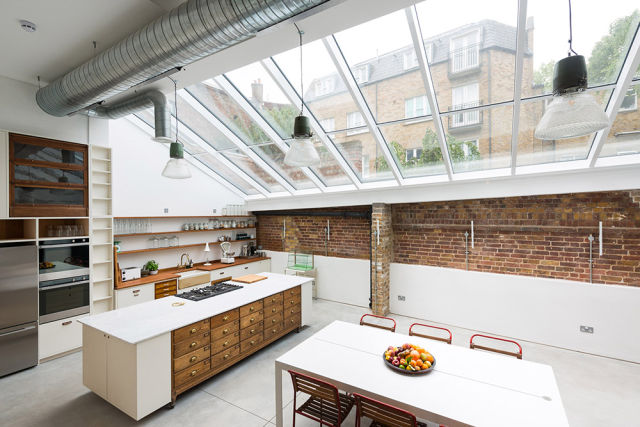Keep your cool

Martin Fahey examines the wellbeing arguments for effective use of modern cooling technologies.
The 2019 Easter Bank Holiday weekend saw the hottest Bank Holiday Monday on record across all of the UK and last year, for a six-week period, the country consistently topped 30⁰C. We are about to enter the season when the environmental impact of increased air conditioning and other cooling requirements come under the spotlight, particularly in the commercial sector.
Much of the news around increased use of air conditioning in the summer is focused rather too much on the negative impact of increasing energy use, rather than the sometimes lifesaving and performance benefits of keeping people cooler during such incredibly hot spells. This continued engagement and focus on the industry provides us all with an opportunity to reassess, innovate and take greater control for a more sustainable approach to our air conditioning solutions.
With budgets becoming tighter and pressures mounting to become more energy efficient, commercial buildings are already adopting the mindset that the priority is to reduce energy use and be the most efficient they can be from the outset. Whether it’s manufacturers, installers or contractors, we should all be adopting an energy hierarchy approach; a sustainable approach whereby you first aim to reduce your need to consume energy, then look at how you can deliver the building’s requirements efficiently with better solutions, and finally how you can deploy renewable energy sources at a building scale. Whatever the system, it will become increasingly important to ensure that the way it is designed, specified, installed and operated, is done in the most efficient way possible.
Modern commercial buildings today will often need some level of cooling. Large amounts of energy are required to both heat or cool buildings in the UK, but the benefits of getting it right can contribute to a healthier and more productive bottom line for the business. The right choices need to be made to find a system that can deliver the comfort needed in the most energy efficient way possible.
In today’s modern working world, it becomes hard to escape the need to consume energy. Particularly when we look at modern working spaces, there needs to be a balance of cooling alongside heating and ventilation.
A business that provides an ideal working environment, or even a variable one to suit different employees, can certainly reap the rewards. It can also help them meet building standards such as the WELL Building Standard, that provides a holistic formula promoting better health and well-being in workplaces. According to a study conducted on the impact of heat on office productivity 1 , employees experience a 2% decrease in productivity for every 1 °C above 25° C.
Thermal comfort – a condition of the mind that expresses satisfaction with the environment, i.e. when someone is not feeling either too hot or too cold – becomes vital when you consider the productivity and wellbeing benefits of employees in commercial buildings across the globe. Ninety percent of business operating costs are staff related, so by improving the overall health of this ‘asset’, you can improve your business.
When you take into account the fact that we spend just five percent of our day outside 2, you start to understand how important it is for businesses to provide employees with an environment in which they feel comfortable and can therefore produce their best work. Part of this is providing the right levels of cooling into a building.

In some instances, cooling within the building is so vital, it can be considered life critical. For example, in the healthcare industry, hospitals and medical centres have to rely on efficient cooling systems to ensure a constant temperature is maintained for its patients and medical equipment. It’s important that we maintain a balanced perspective between the impact and benefits of cooling environments and recognise that often, there is a fundamentally critical need for it.
We have established that air conditioning plays a key role in commercial buildings and those involved in the decisions of which systems to install have a responsibility to ensure their choice represents the most energy efficient one possible. However, manufacturers also have a duty to ensure that the solutions on offer, are as sustainable and efficiently produced as possible. This could be represented by a hybrid system where traditional refrigeration-based systems work with water as a delivery medium, to lower the overall environmental impact of the system or selecting R32 as a refrigerant which has a lower global warming potential to many of its alternatives.
Once installed, understanding the wide range of controls available with your system can also help reduce wasted energy. Many controls give companies the opportunity to monitor and control their air conditioning across a room, building or an entire network from a single PC or device. Many are simply using these controls as a timer, which is fine for some, particularly in smaller buildings with a constant number of employees. However, the range of functions goes far beyond this.
For example, if a meeting room is empty, the device has the ability to automatically recognise this and lower/switch off the air conditioning to conserve energy. They can also be used to monitor energy usage, spotting trends and anomalies to make changes to help further reduce energy costs.
We can’t control the weather, but these are all factors we can control, and we need to recognise this opportunity to do so. The topic of energy efficiency isn’t going away and if anything, it will move closer to the top of the agenda as pressure, quite rightly, mounts to find ways to mitigate the effects of climate change.
Great strides have already been made in the industry. However, there’s always the opportunity for new innovations to help us make smarter decisions and find that balance creating the perfect conditions for a productive workforce and reducing energy requirements and environmental impact.
Martin Fahey is head of Sustainability at Mitsubishi Electric Living Environment Systems







